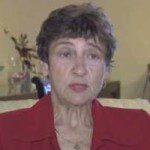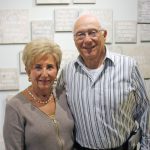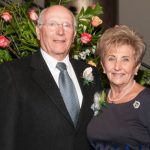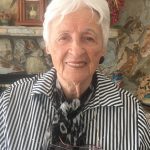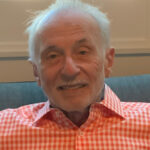The Florida Holocaust Museum Speakers’ Bureau – “Across Generations: Conversations with Survivors and their Descendants”
To book a speaker for your organization, please fill out the form. Speakers can be booked for an event at your school/organization or to meet with your audience online. Please note that while there is no fee to book a speaker, some of our Survivors will need transportation from your organization.
Request a SpeakerHolocaust Survivors
Jackie Albin
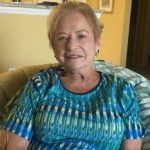 Jacqueline (Jackie) Albin was born in Belfort, France in 1937, two years before the beginning of World War II. When Jackie was two years old, her father was drafted into the French army where he served from 1939-1942. Jackie and her mother lived with her grandparents in Gex, a town in France near the Switzerland border, that had become part of the occupied zone. In 1942, her grandparents were sent to Auschwitz where they were gassed on their arrival.
Jacqueline (Jackie) Albin was born in Belfort, France in 1937, two years before the beginning of World War II. When Jackie was two years old, her father was drafted into the French army where he served from 1939-1942. Jackie and her mother lived with her grandparents in Gex, a town in France near the Switzerland border, that had become part of the occupied zone. In 1942, her grandparents were sent to Auschwitz where they were gassed on their arrival.
In 1944, when the Germans were losing the war, Jackie, her mother, her newly born sister, and a group of others fled to the mountains because it was becoming more and more dangerous for them. Her father, who had joined the French Resistance, stayed behind to fight. After the war ended, Jackie’s mother was able to reunite with her mother and brothers–German Jews who managed to leave Germany in time and who were already living in Chicago.
Edward Herman
Born in Warsaw, Poland in 1931. During the Holocaust, Edward with his mother and sister were forced to live in the Warsaw ghetto. At great risk, his mother would leave the ghetto walls and, passing as a Christian, she would buy food to bring back to her children. Eventually, she was able to pay a guide to have Edward cross over to Budapest, Hungary. In Budapest, he was abandoned by a Jewish man who was supposed to take care of him. Edward lived on the streets until an orphanage for Jewish children was formed. At the end of 1944, he was liberated. He was reunited with his mother after 3 years. His sister also survived. It took the family 10 years to reunite with Edward’s father. Most of Edward’s relatives died in the Holocaust.
Halina Herman (née Kramarz)
Born in Warsaw, Poland in 1939. Her father was a physician and was sent away by the Germans to one of the slave-labor camps in April 1941. Halina never saw him again. Halina’s mother obtained false papers and got a job as a maid in Cracow. She placed Halina with a non-Jewish family who raised her as a Christian child. After the war, Halina was reunited with her mother and continued to go to church until the mother revealed their Jewish identity to her in 1949. They went to France where they stayed until they were able to immigrate to Canada. Most of Halina’s immediate family died in the Holocaust.
Pieter Kohnstam
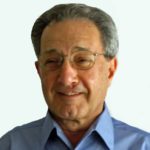 Pieter Kohnstam was born in Amsterdam in 1936. His parents, Hans and Ruth Kohnstam, had fled to Amsterdam, the Netherlands from Germany in the early days of the Nazi regime. In Amsterdam, the Kohnstam family lived downstairs from the family of Anne Frank. Pieter’s mother became a close friend of Edith Frank, and Anne became Pieter’s babysitter. Pieter’s parents decided to flee Amsterdam as Nazi persecution of Jews in the Netherlands increased. The Kohnstams reached safety in Argentina after a dangerous, year-long journey through Belgium, France, and Spain.
Pieter Kohnstam was born in Amsterdam in 1936. His parents, Hans and Ruth Kohnstam, had fled to Amsterdam, the Netherlands from Germany in the early days of the Nazi regime. In Amsterdam, the Kohnstam family lived downstairs from the family of Anne Frank. Pieter’s mother became a close friend of Edith Frank, and Anne became Pieter’s babysitter. Pieter’s parents decided to flee Amsterdam as Nazi persecution of Jews in the Netherlands increased. The Kohnstams reached safety in Argentina after a dangerous, year-long journey through Belgium, France, and Spain.
John Rinde
Born in Przemysl, Poland in 1935. John had one sister. The family owned a toy factory in Przemysl. After the Soviets invaded eastern Poland in 1939, they confiscated the toy factory and introduced food rationing for the local population. John’s family was forced out of their apartment. They moved to Lvov, Poland where they found an apartment and John had a tutor. In 1941, after Germany invaded Lvov, local Jews were forced to into a ghetto where they spent at least six months. John’s family was forced to share an apartment with another family. When roundups and deportations began, John’s mother decided to smuggle the family out – first the children, then then her husband and herself. She obtained false papers and the family escaped to Lublin, where they lived under assumed identities as Polish Catholics until the end of the war. They were joined there by John’s uncle, aunt and their two daughters who hid at the Rindes’ place. After the liberation, the family moved to Paris. John’s younger brother was born there. In 1952, when John was 17 years old, they came to the United States.
Toni Rinde (née Igel)
Born in Przemysl, Poland in 1940. Toni’s mother was a bookkeeper in her parents’ dry goods store, her father was an agricultural engineer. After the German invasion, Jews of Przemysl were forced into a ghetto. The situation of the Przemysl Jews was rapidly deteriorating. One day, Toni’s parents were approached by a woman they didn’t know who offered to take care of their baby. They agreed – at great risk – and Toni lived with Ms. Konoysna for 3 and a half years. She passed as Ms. Konoysna’s niece and had false papers. When roundups and deportations started in the ghetto, Toni’s father arranged an escape for his wife, brother, father, and himself. They hid in the woods and people’s attics and basements. After the liberation, Toni was reunited with her parents and moved with them to Katowice, Poland where her father became the head of the Jewish community. Due to a threat from the local population, the family had to move. Eventually the family was able to immigrate to the United States where Toni met her husband John. Toni’s numerous relatives died in the Holocaust.
Mary Wygodski (née Tabachowicz)
Born in Vilna, Poland (now Lithuania), in 1925. Mary had younger siblings: two sisters and one brother. Her father was a businessman, her mother was a homemaker. When the Nazis took over in 1941, the family was forced into the Vilna ghetto. Mary’s family lived in one room. During the ghetto liquidation, Mary was forcefully separated from her family. She would never see them again. She was sent to several concentration and slave-labor camps. Her father and brother were deported to the Klooga concentration camp in Estonia where they perished. Her mother and little sisters were murdered during the Vilna ghetto liquidation. After the liberation Mary moved to Israel where she met her future husband. Eventually the family moved to the United States where Mary worked as a kindergarten teacher. Mary is the sole survivor of her immediate family.
Second Generation (Children of Holocaust Survivors)
David Baras
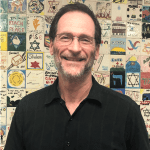 David is the son of Holocaust Survivors and speaks about his parents’ experiences and their effects on him and his family. Besides being a speaker, David is a docent and an active member of the Second Generation group (Generations After) at The Florida Holocaust Museum. As a retired medical doctor, David brings clinical insights to his parents’ experiences and an understanding of their long term impact. By understanding his parents’ past, David is able to demonstrate how they relate to the present in a way that is understood by children and adults alike.
David is the son of Holocaust Survivors and speaks about his parents’ experiences and their effects on him and his family. Besides being a speaker, David is a docent and an active member of the Second Generation group (Generations After) at The Florida Holocaust Museum. As a retired medical doctor, David brings clinical insights to his parents’ experiences and an understanding of their long term impact. By understanding his parents’ past, David is able to demonstrate how they relate to the present in a way that is understood by children and adults alike.
David is married to Mary Jo Baras, who is also a docent at The Florida Holocaust Museum, and has 3 adult children and 2 grandchildren. David and Mary Jo reside in St. Petersburg, Florida.
Barbara Bergren
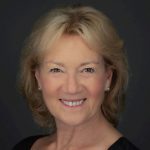 Barbara Bergren is an award-winning author, lecturer and Holocaust educator. She earned her MBA from the University of Hartford and worked in the finance industry for twenty-five years before writing Witness for My Father. This is the story of her father, Martin Weigen, and how his friendship and reunion with Lieutenant John Withers impacted her life.
Barbara Bergren is an award-winning author, lecturer and Holocaust educator. She earned her MBA from the University of Hartford and worked in the finance industry for twenty-five years before writing Witness for My Father. This is the story of her father, Martin Weigen, and how his friendship and reunion with Lieutenant John Withers impacted her life.
Barbara visits schools, religious organizations, and community groups speaking about her father’s experience during and after World War II. She lives with her husband in both Florida and Virginia.
Edward Gross
Edward Gross was born in 1947 in Czechoslovakia to 2 survivors, Bernie and Ruth Gross. He is a retired attorney with extensive public speaking experience. Edward conveys the difficult but miraculous story of the Gross family in which all 7 siblings survived, contrasted by the story on his mother’s side with many tragic losses. His mother was a Holocaust speaker for years before her death, and her testimony was filmed many times, including by the USC Shoah Foundation. His Uncle Alex is the author of Yankele, a Bittersweet Memory, with a forward by Elie Wiesel, who was a lifelong friend after they survived Buchenwald together. His Uncle Sam was one of the founders of The Florida Holocaust Museum.
Edward’s presentation, illustrated with photos, maps and other visuals, traces his family’s story of survival: the life and hardships of his family’s upbringing in a remote area of Czechoslovakia during the rise of the Nazis, his mother’s story of being a 14-year-old child leaving home to work in distant places, concentration camp experiences (Auschwitz, Stutthof and Bromberg-Ost), a harrowing escape from a death march, and the dangers of going home in post-war Eastern Europe. Edward also provides excerpts from his Uncle Alex’s descriptions of Hitler Youth, the ghetto, the “Train to Hell,” concentration camps (Birkenau, Buna/Monowitz and Buchenwald), and his near-death rescue by the U.S. Army. The survival story culminates with a large, successful family in the United States. Edward also describes what it was like to grow up in an extended family of Holocaust survivors, and the effect on him today. At the end of each presentation, his mother will have the last word.
Harry Heuman
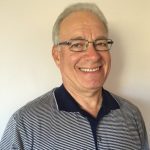 Harry Heuman is a docent and a speaker at The Florida Holocaust Museum and regularly presents information about the history of the Holocaust as well as his parents’ stories to Hillsborough, Pasco & Pinellas County School Districts grades 6 – 12. Harry was a presenter at Miami University in March 2018. Harry’s parents were survivors of the Holocaust. In addition to his parents, the only other survivors were one grandparent and an aunt and uncle. Subsequent to his father’s liberation from Dachau and his mother’s liberation from Auschwitz, Harry was born in a Displaced Persons Camp in southern Germany.
Harry Heuman is a docent and a speaker at The Florida Holocaust Museum and regularly presents information about the history of the Holocaust as well as his parents’ stories to Hillsborough, Pasco & Pinellas County School Districts grades 6 – 12. Harry was a presenter at Miami University in March 2018. Harry’s parents were survivors of the Holocaust. In addition to his parents, the only other survivors were one grandparent and an aunt and uncle. Subsequent to his father’s liberation from Dachau and his mother’s liberation from Auschwitz, Harry was born in a Displaced Persons Camp in southern Germany.
Harry is a member of the Sunrise St. Petersburg Rotary Club and a former member of the Hyde Park & Lutz Rotary Clubs. He has served District 6890 in various District and Club positions, including being the Team Leader for a Group Study Exchange to Australia in 2006. He has also graduated from the Rotary Leadership Institute. Harry has served many years on the Board of Directors of The Florida Holocaust Museum, Hillsborough Achievement Resources Center and is a graduate of Leadership Hillsborough.
In June 2012, Harry retired from Hillsborough County’s Planning and Growth Management Department with 29 years of service in various managerial and administrative positions. He also has 15 years of professional experience in other jurisdictions throughout the country. Harry has authored many public documents and has been published through an international entity. He has a BA (Sociology & Political Science) from Illinois Wesleyan University and a MUP (Master of Urban Planning) from Texas A&M’s College of Architecture. Subsequent to his retirement Harry established H3 Development Solutions, Inc. to guide others through the “Amazing Maze” of governmental land development regulations.
Harry resides in St. Petersburg. He has two children and five grandchildren.
Clara Kahn
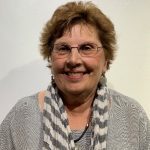 Clara Kahn is the daughter of Holocaust survivors. Both her parents were from southeastern Poland. Clara’s parents experienced both Russian and German occupation during the war. Clara’s mother Sally Kleinberg lived with her mother, father, and three sisters. After being separated from her family, Sally managed to reunite with two of her sisters under unlikely circumstances, and thanks to the courage of a non-Jewish farmer who hid them, the three sisters were able to survive.
Clara Kahn is the daughter of Holocaust survivors. Both her parents were from southeastern Poland. Clara’s parents experienced both Russian and German occupation during the war. Clara’s mother Sally Kleinberg lived with her mother, father, and three sisters. After being separated from her family, Sally managed to reunite with two of her sisters under unlikely circumstances, and thanks to the courage of a non-Jewish farmer who hid them, the three sisters were able to survive.
David Tauber, Clara’s father, was forced to become part of the Red Army and was the only survivor of his family. After the war, David found out of the death of his wife. Eventually, he met Sally and the two were married.
In 1946 Clara was born in a displaced persons camp outside of Nuremberg, Germany where she lived until her family was able to move to New York City in 1949.
Having taught at Hebrew schools for many years, Clara now speaks to student groups about her parents’ experiences. She currently resides in Sarasota, FL.
Judy Ludin
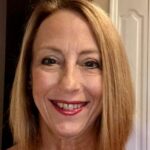 Judy Ludin is the daughter of Holocaust survivors, Marietta and Ernest Drucker. Born in Michigan, she has lived most of her life in St. Petersburg, Florida. Her career consisted mainly of work in the not-for-profit sector; her most recent position was Chief Development and Communications Officer for Menorah Manor, a not-for-profit Jewish nursing center. After 30 years of service to Menorah Manor, she retired in December 2020 and is now a speaker and docent at The Florida Holocaust Museum.
Judy Ludin is the daughter of Holocaust survivors, Marietta and Ernest Drucker. Born in Michigan, she has lived most of her life in St. Petersburg, Florida. Her career consisted mainly of work in the not-for-profit sector; her most recent position was Chief Development and Communications Officer for Menorah Manor, a not-for-profit Jewish nursing center. After 30 years of service to Menorah Manor, she retired in December 2020 and is now a speaker and docent at The Florida Holocaust Museum.
She has been married for 43 years to Eric, an attorney. They have 2 grown sons, Josh and Jacob. They spend their free time cruising on their sailboat.
Diane H. Mandell
Diane is the daughter of two Holocaust Survivors. Her father, Ed, was in the Warsaw Ghetto and had multiple close calls trying to survive. His mother tried to arrange a rescue operation for him but he was abandoned by a Jewish man who was supposed to help him. Eventually, Ed ended up in an orphanage in Hungary and was reunited with his mother after the war.
Diane’s mother, Halina, survived the Holocaust passing as a Catholic child in a Polish village. Halina’s mother also survived and got reunited with her daughter – she revealed their Jewish identity to Halina several years after the war. Halina’s father was a physician and died while being deported to a death camp.
In spite of the traumas they lived through, Diane’s parents share hope and optimism as evidenced in the PBS Frontline documentary “Never Forget To Lie.” Both Halina and Ed speak to school groups at The Florida Holocaust Museum. Their experiences have inspired Diane to speak for those who are not here anymore and cannot share the lessons of the Holocaust. Diane has volunteered to speak to groups at the Museum and is honored to do so.
As a graduate of Case Western Reserve, she is a Senior Therapist and Administrator of a large group counseling practice, using empathy and compassion in her work.
She is a mom who teaches her child Tikkun Olam – repairing the world one piece at a time.
Sandy Mermelstein
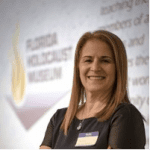 Sandy has been a part of the Museum since its inception in 1992 as volunteer. She joined the staff in 1999. Sandy has completed the Jewish Foundation for the Righteous Summer Institute for Teachers at Columbia University, and Eppley Institute for Parks and Public Lands Program from Indiana University. She has facilitated presentations for teachers at the Museum’s Summer Institutes and assisted with the initial planning of contents of the Museum’s teaching trunks. Sandy has planned and taught continuing education for docents and has worked with more than 100,000 school children. She has conducted numerous school, adult, and VIP tours of the Museum’s core exhibition and traveling exhibitions. She is the daughter of Holocaust survivors and speaks regularly, to both adults and children, about her parents and other survivors’ experiences. Sandy leads the project “Voices of Generations” that assists the Museum’s Second Generation with building presentations about their parents’ experiences. She is the 2018 recipient of The Florida Holocaust Museum’s Legacy Award.
Sandy has been a part of the Museum since its inception in 1992 as volunteer. She joined the staff in 1999. Sandy has completed the Jewish Foundation for the Righteous Summer Institute for Teachers at Columbia University, and Eppley Institute for Parks and Public Lands Program from Indiana University. She has facilitated presentations for teachers at the Museum’s Summer Institutes and assisted with the initial planning of contents of the Museum’s teaching trunks. Sandy has planned and taught continuing education for docents and has worked with more than 100,000 school children. She has conducted numerous school, adult, and VIP tours of the Museum’s core exhibition and traveling exhibitions. She is the daughter of Holocaust survivors and speaks regularly, to both adults and children, about her parents and other survivors’ experiences. Sandy leads the project “Voices of Generations” that assists the Museum’s Second Generation with building presentations about their parents’ experiences. She is the 2018 recipient of The Florida Holocaust Museum’s Legacy Award.
Ruth Wade
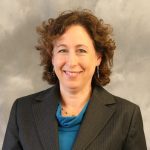 Ruth Wade is the daughter of Holocaust Survivor Sidney Finkel, who still speaks in Arizona schools, telling his story accompanied by his memoir and video. He is thrilled about her decision to join him on his journey to educate young people about the lessons of the Holocaust, sharing his story of suffering, perseverance and hope.
Ruth Wade is the daughter of Holocaust Survivor Sidney Finkel, who still speaks in Arizona schools, telling his story accompanied by his memoir and video. He is thrilled about her decision to join him on his journey to educate young people about the lessons of the Holocaust, sharing his story of suffering, perseverance and hope.
As a founding member of the Generations After community in Ann Arbor, Michigan, Ruth wrote and led Holocaust Remembrance (Yom HaShoah) services for over 16 years, weaving together the group’s family stories. Prior to retiring from a large corporation in 2016, she spent many years in executive training roles, developing leaders, franchises and their team members.
Ruth moved to the St. Petersburg area in 2017 and has one son, named after her father’s Survivor brother, Isaac.
Third Generation (Grandchildren of Holocaust Survivors)
Michael A. Igel
Michael A. Igel is Board Chair of The Florida Holocaust Museum and Chair of the Florida Commissioner of Education’s Task Force on Holocaust Education.
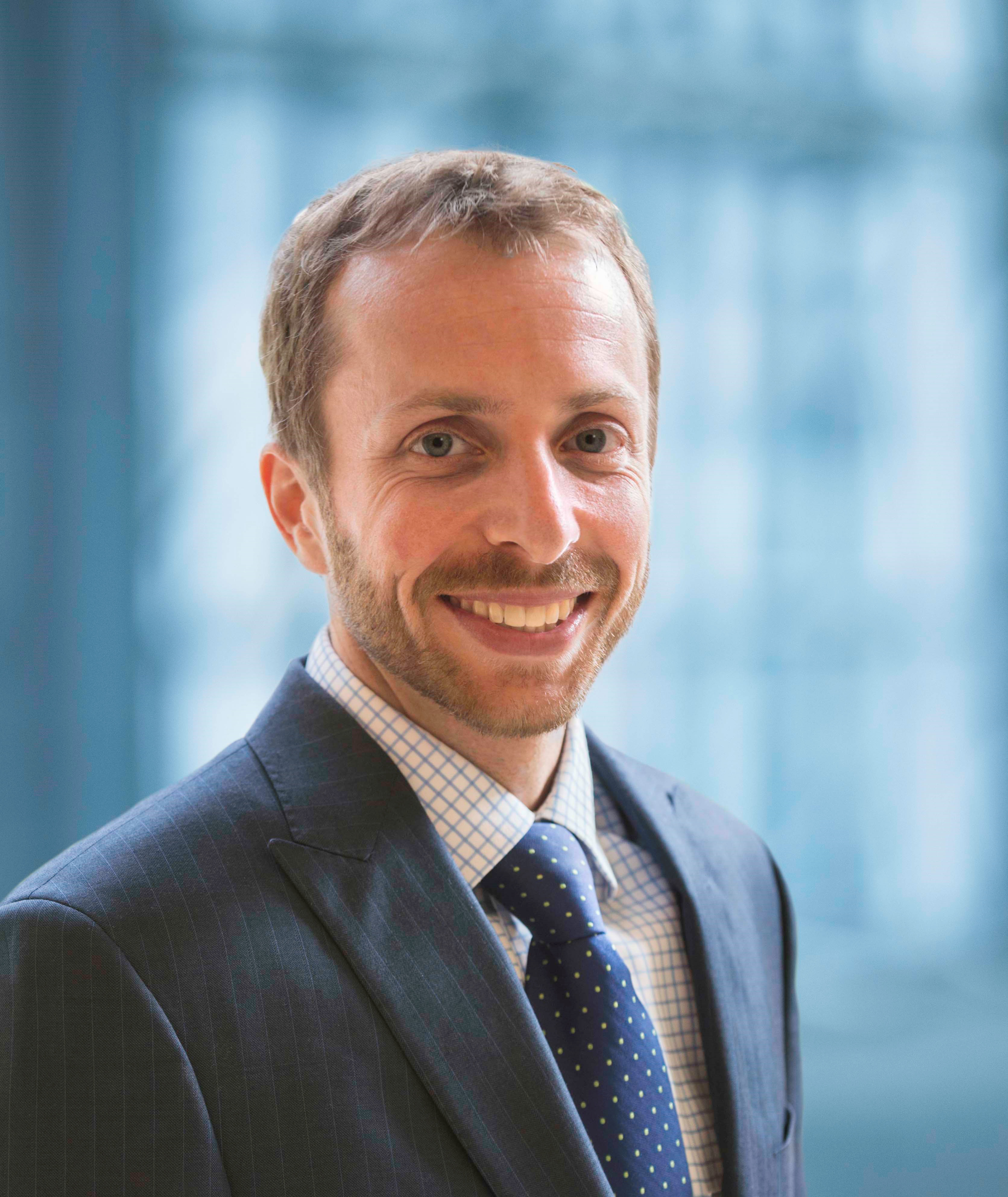
The grandson of Holocaust survivors (Stanley and Lusia Igel, Henry Ferber), Michael frequently speaks about his entire family’s experience and has seen firsthand how Holocaust education improves the world. Igel has served on The Florida Holocaust Museum Board since 2014 and has held the role of Chair since 2018. He was appointed to the Florida Education Commissioner’s Task Force on Holocaust Education in 2021 and looks forward to ensuring that everyone learns the lessons of the Holocaust.
By profession, Igel is an attorney at Johnson Pope, where he focuses on healthcare law and is Board Certified in Health Law by the Florida Bar.
Dana N. Justus
Dana (Nicoletti) Justus was born and raised in Clearwater, Florida. She attended Berkeley Preparatory School and the University of Florida, where she received her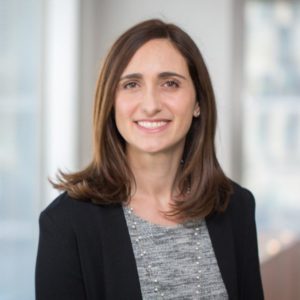 degree in Political Science and Psychology in 2005. After graduation, Dana moved to Washington, D.C. to attend law school at the American University’s Washington College of Law (graduating in 2011), and is a Trademark/Brand Protection Counsel at Sterne, Kessler, Goldstein & Fox PLLC. Dana married a fellow attorney, Michael Justus, in 2013. They lived in Washington, D.C. and then Alexandria, VA, where they had their two children, Benjamin (in 2015) and Marin (in 2019). In 2021, they moved their family to South Tampa in order to be closer to Dana’s large family in the Tampa Bay area. Dana’s children are now attending Roosevelt Elementary and Amy Gail Buchman Preschool at Congregation Schaarai Zedek, and she is an involved PTA member at both schools.
degree in Political Science and Psychology in 2005. After graduation, Dana moved to Washington, D.C. to attend law school at the American University’s Washington College of Law (graduating in 2011), and is a Trademark/Brand Protection Counsel at Sterne, Kessler, Goldstein & Fox PLLC. Dana married a fellow attorney, Michael Justus, in 2013. They lived in Washington, D.C. and then Alexandria, VA, where they had their two children, Benjamin (in 2015) and Marin (in 2019). In 2021, they moved their family to South Tampa in order to be closer to Dana’s large family in the Tampa Bay area. Dana’s children are now attending Roosevelt Elementary and Amy Gail Buchman Preschool at Congregation Schaarai Zedek, and she is an involved PTA member at both schools.
Dana’s commitment to The Florida Holocaust Museum is a direct result of being a “3G.” Her grandmother (Lisl Schick) helped to found the Museum, serving as a Life Member, Board Member, and beloved survivor speaker; her mother (Nancy Greenberg) has also been involved with the Museum for many years as a committee chair and volunteer. Even before moving back to Florida, Dana always made it a point to plan a visit for nearly every To Life event and support the Museum as much as possible. Upon her move back to Tampa Bay, Dana connected with individuals active in the Museum and voiced her desire to carry on her grandmother’s legacy by volunteering with and further supporting the Museum, and is now a member of the Board of Directors. It is Dana’s fervent desire to reach the next generations so that the Museum can continue its crucial mission for many years to come.
Brendon Rennert
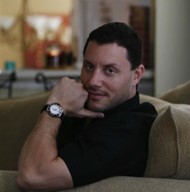
Brendon Rennert is the grandson of Tuvia Bielski. After the Nazi occupation of 1941, three Jewish brothers, Tuvia, Asael and Zus Bielski decided to flee to the forest in today’s Belarus. The partisan group turned no refugee away and as a result more than 1,200 Jewish men, women and children defied the “Final Solution.” Their effort was the largest armed rescue operation of Jews by Jews during World War II. The Bielski brothers’ compelling story is depicted in the film Defiance, a major motion picture by Paramount Vantage starring Daniel Craig as Tuvia Bielski.
Growing up, Rennert knew that his grandparents were special as he recalls strangers always stopping by his grandparents’ Brooklyn apartment. It wasn’t until he was a teenager that he fully understood his grandparents’ story of courage and compassion. Rennert is helping teach the life lessons of the Bielski brothers to the next generation through speaking engagements and teacher trainings. He also helped spearhead an exhibition at The Florida Holocaust Museum titled Courage & Compassion: The Legacy of the Bielski Brothers.
Today, Rennert lives with his family in Tampa, Florida, works to advance Holocaust education, serves as a volunteer for The Florida Holocaust Museum, and works professionally in sales. He and his family were the recipients of The Florida Holocaust Museum’s Legacy Award in 2021.
Liberator
Arthur Sheridan
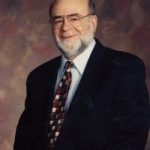 In 1942, at age 17, Arthur Sheridan enlisted in the Army. Assigned to the 60th Armored Infantry Battalion of the 20th Armored Division, he arrived in Europe following the D-Day invasion, and fought his way across France and into Germany. Outside Munich, the 60th Armored Infantry Battalion of the 20th Armored Division found and liberated the concentration camp at Dachau. As an infantryman, Sheridan was among the first American soldiers to enter the camp.
In 1942, at age 17, Arthur Sheridan enlisted in the Army. Assigned to the 60th Armored Infantry Battalion of the 20th Armored Division, he arrived in Europe following the D-Day invasion, and fought his way across France and into Germany. Outside Munich, the 60th Armored Infantry Battalion of the 20th Armored Division found and liberated the concentration camp at Dachau. As an infantryman, Sheridan was among the first American soldiers to enter the camp.
Request a Speaker


